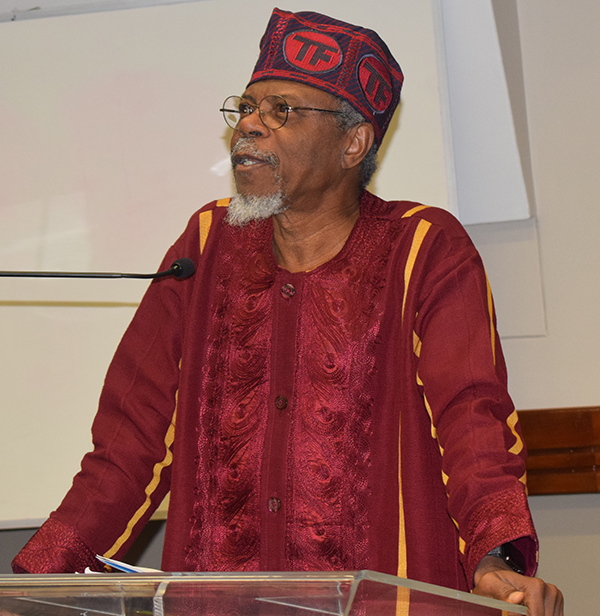The North-West University’s (NWU’s) Indigenous Language Media in Africa (ILMA) research entity hosted a hybrid public lecture on 3 August 2023 as part of its Annual Public lecture series.
Prof Toyin Omoyeni Falola, holder of the Jacob and Frances Sanger Mossiker Chair in the Humanities at the University of Texas in the United States, gave the lecture on the Mahikeng Campus.
The topic of the lecture was “Communication, media, culture, and evolving trends in the world of indigenous languages”.
According to Prof Falola, the notion of "indigeneity" in African societies is a multifaceted concept encompassing communities that have experienced displacement due to European colonialism and subsequent development.
“In recent times, there has been a significant surge in global endeavours to safeguard the rights of indigenous communities. The widespread acceptance and implementation of the United Nations Declaration on the Rights of Indigenous People exemplifies this positive trend. The role of language in indigeneity is of great importance, as it serves as a powerful tool for cultural exchange and the safeguarding of knowledge,” he said.
Prof Falola added that the emergence of colonialism and globalisation have posed a significant challenge to the preservation and continuity of indigenous languages.
“Governments and organisations have now implemented language revitalisation programmes to preserve endangered languages. The media has emerged as a vital player in this endeavour, contributing significantly to cultural production and facilitating language learning. However, we need stronger and more comprehensive endeavours to combat the possible disappearance of countless indigenous languages and to safeguard their invaluable cultural legacy.”
According to Prof Falola the rich tapestry of African languages faces a pressing challenge as several teeters on the brink of extinction.
“This predicament is particularly pronounced in countries like Nigeria, where the widespread use of English has emerged as a dominant force, posing a significant threat to the survival of minority languages. The effects of globalisation on language shift can be seen in various regions across the globe, including Canada and Mexico. In these areas, native languages are experiencing a decline because of the growing influence of more globally recognised languages like English and Spanish.”
He said that despite the numerous challenges and potential risks, some scholars recognise the immense potential of globalisation and modern communication media for revitalising languages.
“Incorporating indigenous languages in rap music and social media illustrates how globalisation's infrastructures can be harnessed for positive purposes. By embracing these platforms, cultural expressions and linguistic artefacts can reach a wider audience, fostering a greater appreciation for diverse cultures. Nevertheless, the current emphasis on indigenous language trends highlights the ongoing exploration of using modern communication media to safeguard these languages' vitality.
“The influence of media, encompassing both traditional and social platforms, has been instrumental in transforming how indigenous languages are perceived and in encouraging their active use,” said Prof Falola.
Prof Gilbert Motsaathebe, research professor at ILMA, thanked Prof Falola for delivering a thought-provoking talk.

Prof Toyin Omoyeni Falola
